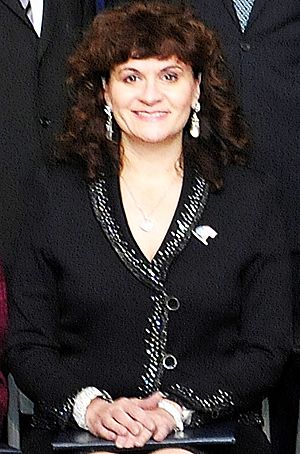Karen Panetta facts for kids
Quick facts for kids
Karen Ann Panetta
|
|
|---|---|

Panetta with other winners of the 2011 PAESMEM award.
|
|
| Alma mater | Northeastern University Boston University |
| Scientific career | |
| Institutions | Tufts University |
| Thesis | Multiple domain concurrent simulation of interacting experiments and its application to multiple stuck-at fault simulation (1994) |
Karen Ann Panetta is an American computer engineer, inventor, and professor. She is a Dean at Tufts University where she teaches and does research. Her work focuses on machine learning (teaching computers to learn) and automated systems like robots.
Panetta is a member of many important science groups, including the Institute of Electrical and Electronics Engineers and the National Academy of Engineering. She has also given advice on science and technology to leaders like the President of Malawi and a U.S. Ambassador.
Contents
Early Life and Schooling
When Karen Panetta was a child, she loved solving problems. Her father didn't go to college, but he wanted her to become an engineer. He told her that engineering would help her be independent when she grew up.
Panetta went to Boston University and earned a bachelor's degree in computer engineering. After that, she studied at Northeastern University for her master's degree and her Ph.D. (the highest degree you can get). Her studies focused on robotics and information systems.
A company called Digital Equipment Corporation (DEC) paid for her advanced degrees. In return, she promised to become a professor. DEC believed that students would get a better education if their teachers had real-world engineering experience.
Career and Research
In 1994, Panetta began working at the Tufts University School of Engineering. She was the first woman in the Electrical and Computer Engineering department to be awarded tenure, which is a permanent teaching position.
Panetta's research is about creating smart ways for computers to understand images and signals. She is especially interested in helping robots "see" and improving medical pictures. Her main research areas are Artificial Intelligence (AI), Machine Learning, and visual systems for computers.
For example, Panetta created software that helps doctors diagnose pneumonia caused by COVID-19. She also made a program that shows dentists exactly which parts of a patient's mouth need work.
Amazing Inventions
While working at DEC, Panetta created special computer instructions, called algorithms, that helped make the first "digital twin" of a computer chip. A digital twin is a perfect virtual copy of a real object. This allowed engineers to test the chip on a computer before it was even built.
Panetta also invented new ways to take pictures underwater. Her inventions are used by rescue teams to find things and by scientists to explore the ocean.
Making Computers See Like Humans
One of Panetta's biggest goals was to make computers see the world more like people do. She was inspired to do this after the events of September 11, 2001. She wanted to create technology that could improve video in real-time to help with safety and security.
Her inventions include:
- Human-like Vision: She created systems that let computers see and understand images in a way that is similar to the human eye.
- Edge Detection: She developed algorithms that help computers focus on the important parts of an image and ignore the rest. This can help airport screeners spot dangerous items or help doctors find cancer tissue in a medical scan.
Her work has been very important for medicine, security, and even farming. It has helped with things like finding cancer, improving homeland security, and making sure our food is safe.
Making a Difference
Panetta has always wanted to use her engineering skills to help people. Her research in AI and computer vision has made a big impact in many areas.
She has also used her skills for humanitarian projects. For example, she used drones with AI cameras to watch elephants. This helped figure out the safest places for them to live, away from poachers and farms. She has also worked on projects related to autism awareness and improving healthcare in other countries.
Helping Women in Engineering
Panetta works hard to get more women and girls interested in engineering. In 1999, she started a group called Nerd Girls. The group's goal is to show that science and engineering are for everyone and to break down stereotypes about what a scientist looks like. Today, Nerd Girls is a well-known national program.
She is also a leader in the Institute of Electrical and Electronics Engineers (IEEE) Women in Engineering program. She co-wrote a book called Count Girls In, which gives parents ideas on how to encourage their daughters.
Awards and Honors
- 2011 Anita Borg Institute Women of Vision Award
- 2012 Presidential Award for Excellence in Science, Mathematics, and Engineering Mentoring
- 2013 William E. Sayle II Award for Achievement in Education
- 2013 IEEE Award for Distinguished Ethical Practices
- 2020 IEEE-USA Award for Distinguished Literary Contributions Furthering Public Understanding and the Advancement of the Engineering Profession
- 2021 Elected to the National Academy of Inventors
 | DeHart Hubbard |
 | Wilma Rudolph |
 | Jesse Owens |
 | Jackie Joyner-Kersee |
 | Major Taylor |

